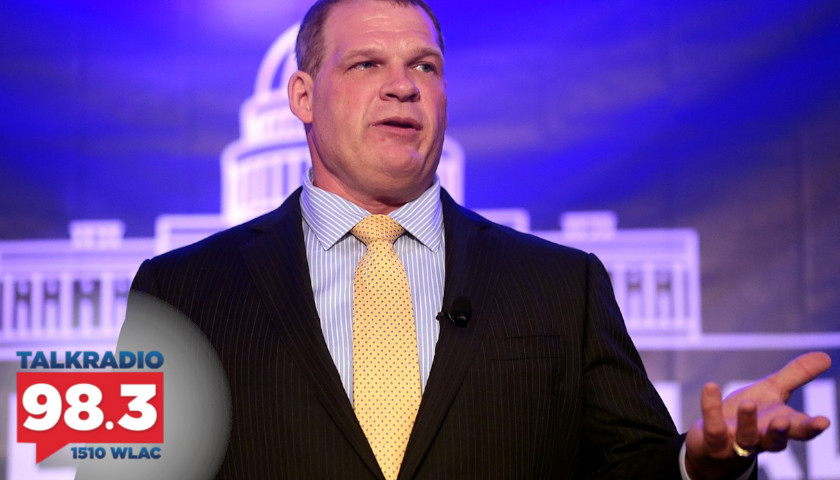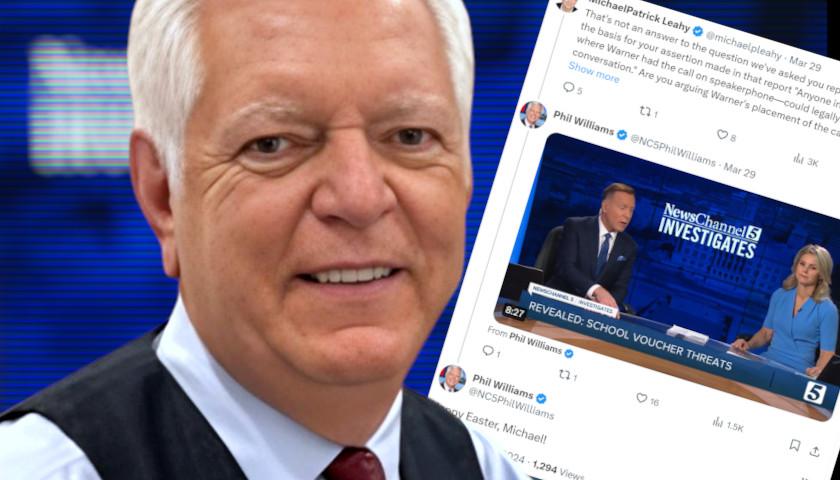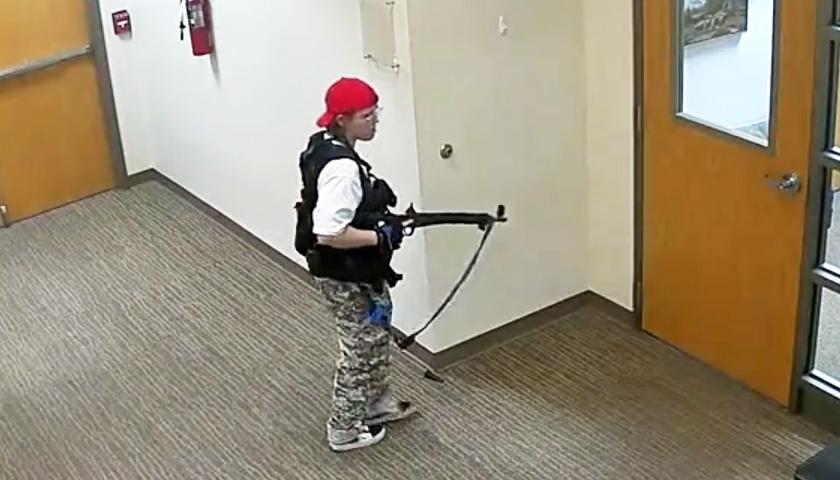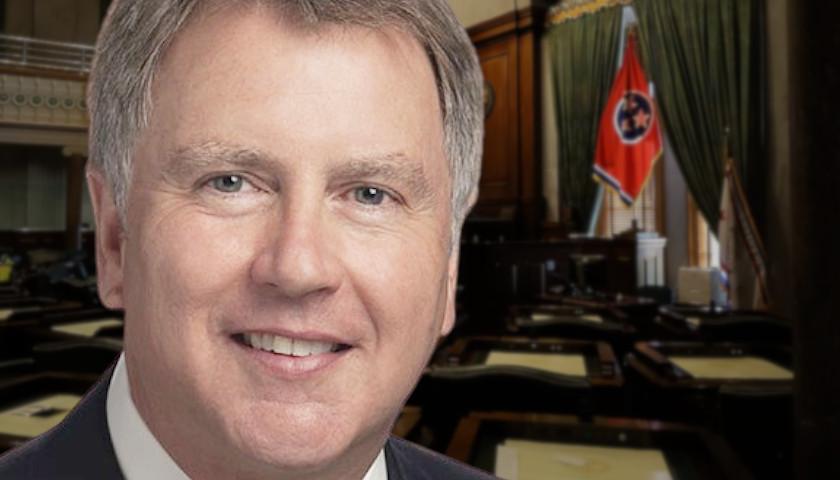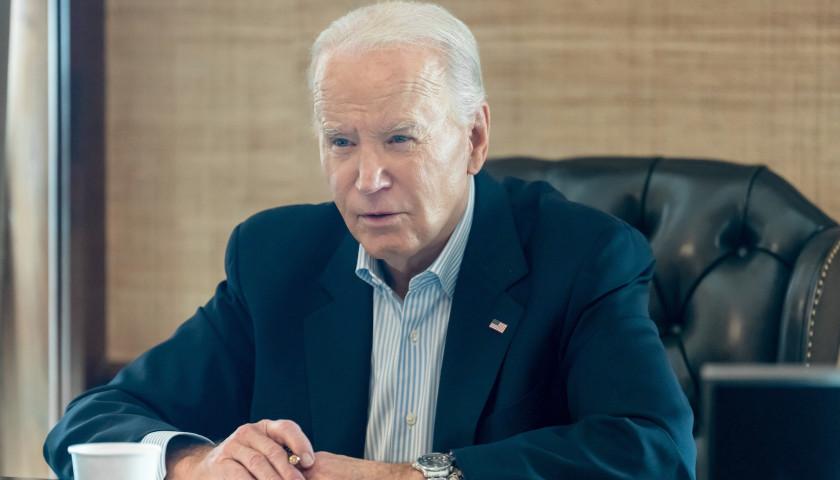Live from Music Row Thursday morning on The Tennessee Star Report with Michael Patrick Leahy – broadcast on Nashville’s Talk Radio 98.3 and 1510 WLAC weekdays from 5:00 a.m. to 8:00 a.m. – host Leahy welcomed Knox County Mayor Glenn Jacobs to the newsmakers line to discuss his background and political philosophy motivating his quest for U.S. term limits.
Leahy: We are joined now on the newsmaker line by Glenn Jacobs, mayor of Knox County and the state chair for U.S. term limits. Good morning, Mayor Jacobs.
Jacobs: Hey, Michael, how are you this morning?
Leahy: Well, we’re delighted to have you on. I think you’ve been on our program a couple of times before to talk about politics in general.
Now you just became the state chairman for U.S. term limits. Tell us why you’ve chosen to accept this responsibility and why it’s important.
Jacobs: Term limits, I think, are very important. They’re a way that specifically talking about congressional term limits here, that maybe we can start the process of fixing Congress.
The country is extremely divided and Congress is broken. That’s the one thing that we can all agree on. I think that term is can help start the process of maybe fixing Congress or at least getting people in Congress that can help fix it.
So I think it is very important. And I also think it’s something that everyone pretty much agrees on across Tennessee. Congressional term limits have 78 percent approval rating.
So it’s something that we all agree on. And in this time when our nation is so divided, if nothing else, that’s a good thing and a positive cause that we could all get behind.
Leahy: And that’s a very important point. It’s something that we can all get behind. I was reading over the weekend a book by Daniel Boorstein about the Americans, the late Daniel Boorstein.
And what he said was what really made America great was not what we disagreed over, but the fact that there were a number of things upon which we could agree. So it sounds like you have a similar political philosophy.
Jacobs: Absolutely. A lot of the issues I think the country faces, they start with the media and how the media divides us, and how politicians divide us.
There are some things that people aren’t going to agree on frankly. And I know that and you know that, too. There are folks on the left, and I’m just never going to agree with them on a lot of issues.
But instead of concentrating on those, let’s work with the people that we can work with on the issues that we do agree on. I think what happens too often is we start where we disagree and kind of work our way from there, instead of starting where we agree and understanding that there are things we’re going to disagree on.
Agreeing to disagree on those things but working on the things that we do agree on. I think we’d be in a much better place.
Leahy: I note here in Tennessee that you’re backing a passage of House Joint Resolution Eight. Our good friend State Representative Chris Todd from Jackson was the sponsor of that bill. It passed the House 53-34 in April.
It hasn’t made it to the Senate. It is going to come back in January when the Tennessee General Assembly reconvenes. Will you be coming into Nashville to speak before the Tennessee General Assembly in support of that resolution?
Jacobs: I’m sure I will. We’ll be going around the date, actually, to build support for the Senate passing the HR8. So far, four states have called for an Article Five Convention, which is what we’re talking about here.
It is a convention called by these states to propose an amendment to the United States Constitution. In this case, would be to term limit Congress.
Once that legislation passes the Senate, Tennessee would become the fifth state. Then the amendment would go back to the state legislatures for modification.
Takes three-quarters of the state legislatures voting affirmatively to ratify that. It’s about 38 of them.
The process is still in its early stages, and I think it would be wonderful if, like we do with so many other things, Tennessee would be one of the states that leads the way.
Leahy: When you come to Nashville next time to promote this resolution, will you come in the studio? We’ll get a big, big extra chair (Jacobs laughs) so that you can fit into it.
I think your what, your 6’9? On a good day, I’m 5’9 and a half. So you’re a little taller than I am.
Jacobs: Man, I’d love to come by and visit with you. And I’m used to not really fitting in furniture, so you don’t even have to get a big chair out. I’ll just come in whenever you want and we’ll make it work.
Leahy: We will make a special Glenn Jacob’s chair. By the way, we’re very interested in your transition from being a professional wrestler to being a politician.
Some would say there’s not that much difference between those two occupations. (Jacobs chuckles)
Jacobs: I would actually disagree with that. There is a lot that the two have in common, and I think that’s really true of anything.
Politics is everywhere in human relations, right? Anything that we do, if it involves more than me and if it involves me and you and someone else, it becomes political.
And it’s the same in WWE. I had to deal with a lot of backstage politics. How do you get things done? How can you persuade people that our way is the right way?
How do you build influence among people? And that’s really what politics is all about. A little bit different than government, but nevertheless, it’s really about that human interpersonal relationship aspect of it.
In WWE, I took a lot of physical abuse. And now in government, I take a lot of verbal and mental abuse. So you have that too.
Leahy: (Chuckles) Mayor Jacobs, I don’t know that much about your backstory. Where did you grow up?
Jacobs: I was actually born in Madrid, Spain. My dad was in the United States Air Force. I was born on Torhone Airbase in Madrid. Shortly thereafter, my folks came back to the states. I grew up about an hour and a half north of St Louis on a farm five miles outside of a town of 350 people.
Actually a lot like what we see here in East Tennessee in some places. Good people that worked hard. Of course, my parents instilled a work ethic in me and a love of America.
My dad is a 21-year military veteran. He served on the USS Antietam in the Navy during the Korean War. He then switched services and was a loadmaster on the C130’s the big cargo planes during Vietnam.
I ended up going to Truman State University on a basketball scholarship. Switched to play football. I had a career-ending knee injury, and that’s when I got into professional wrestling.
Moved to East Tennessee in 1995. I think this is the greatest place in the world to live. I love it here and I don’t ever want to leave.
Leahy: You grew up an hour north of St Louis. How far were you from Hannibal, Missouri the home of Mark Twain?
Jacobs: Hannibal was about 20 minutes. It was the big town in my area. That was the place where you go to at the time, that was the only Walmart. Hannibal played a pretty big role in my life.
Leahy: Well, I’ve been to Hannibal, Missouri. My personal story, the first time I went to Hannibal, Missouri, was the summer of 1974 between my freshman and sophomore years in college.
I decided it would be cool to try to hitchhike across the country. Hannibal was as far West as I made it. I went from New York to Hannibal. (Jacobs laughs)
I had, like, 10 bucks in my pocket, something like that. And I got to stay overnight at the Catholic Church there. The priests had pity on me.
And the deal was I had to sing for my supper. Literally, sing for my supper. There were a bunch of nuns there over for dinner, and I was in a singing group, and I sang for my supper, literally.
But I had great memories of Hannibal, Missouri. Hey, can you sick through the break with us Mayor Jacobs?
Jacobs: Yes, Sir.
Listen to the second hour here:
– – –
Tune in weekdays from 5:00 – 8:00 a.m. to the Tennessee Star Report with Michael Patrick Leahy on Talk Radio 98.3 FM WLAC 1510. Listen online at iHeart Radio.
Photo “Glenn Jacobs” by Gage Skidmore. CC BY-SA 2.0.
